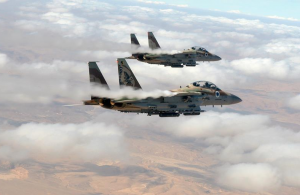
Although the Israeli Air Force operations were coordinated with Egyptian authorities, officials from Jerusalem and Cairo refused to confirm the New York Times report.
NEW YORK – Egypt has allowed Israel to conduct more than 100 air strikes in northern Sinai in an effort to root out terrorists affiliated with Islamic State, The New York Times reported on Saturday.
For more than two years, unmarked Israeli drones, helicopters and jets have carried out a covert air campaign in the area with the approval of Egyptian President Abdel Fattah al-Sisi, who has struggled to contain the deadly threat in the restive peninsula, according to the report.

Kishtah, the Palestinian liaison between Hamas and ISIS in the Sinai Peninsula
According to the Times, who spoke to seven current or former British and American officials involved in Middle East policy, Israel began carrying out the strikes shortly after ISIS insurgents brought down a Russian charter plane over the peninsula in October 2015, killing all 224 people aboard.
The United States has since credited Jerusalem “with killing a long roster of militant leaders” in Sinai, helping to stabilize the border between Israel and Egypt as Cairo works to regain its footing in the region.
The Israeli Censor’s Office has not allowed the media to publish any reports about the alleged operations, and all source material has been attributed to foreign reports.
The security effort has helped to shepherd in an unprecedented era of cooperation between the two nations, according to the Times, marking the most dramatic evidence yet of a quiet reconfigurations of the politics of the region.
The air campaign, however, has been conducted in the shadows, with worries that news of the collaborative effort would cause a backlash on the Egyptian street, which views Israel as an enemy.
Bilateral cooperation started to flourish soon after Sisi took over the presidency in 2014. Israel helped lobby Washington to accept the new Egyptian leader soon after he took over the country in a military coup against the Muslim Brotherhood, leading to favorable ties between the security establishments on both sides.
The security challenges partly stem from the Israeli-Egyptian peace treaty of 1979, which divided Sinai into three zones, demilitarized to different degrees. The agreement inadvertently created a large, uninhabited space with a faint security presence that was ideal for extremist elements to fill, according to the Times.
Since Sisi came to power, Egypt has seen hundreds of its security personnel killed in terrorist attacks, mostly conducted by its No. 1 foe in Sinai, Ansar Bayt al-Maqdis (the Partisans of Jerusalem).
In 2014, Ansar Bayt al-Maqdis declared itself an affiliate of Islamic State. Along with its operations against Egyptian soldiers and policemen, the group is thought to be responsible for attacks on Coptic Christians, slaughtering villages and destroying churches, the Times noted.
Ansar Bayt al-Maqdis is also believed to have destroyed the Russian charter plane in 2015, which, according to foreign reports, led Jerusalem to approach Cairo with its plan to fight the Sinai-based extremist group.
View original The Jerusalem Post publication at:
http://new.israelandstuff.com/wp-admin/post-new.php






 Israeli New Shekel Exchange Rate
Israeli New Shekel Exchange Rate